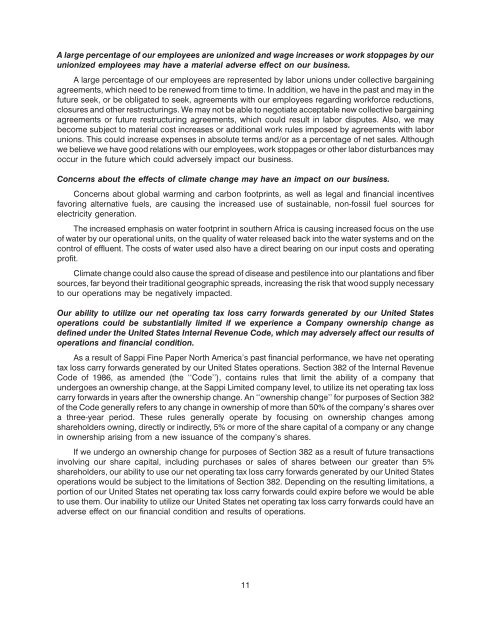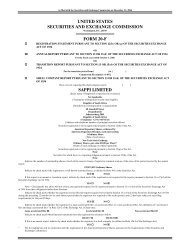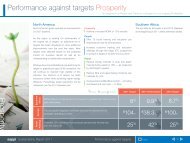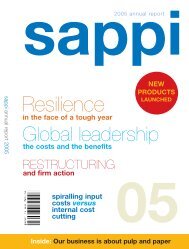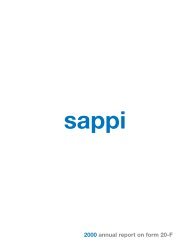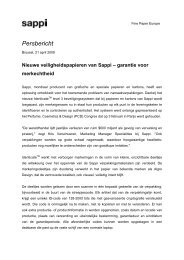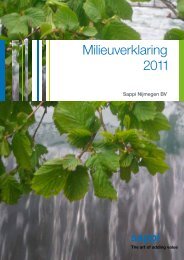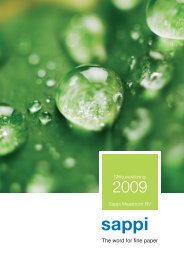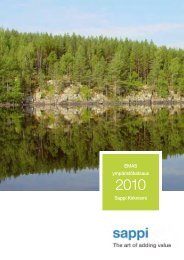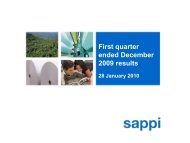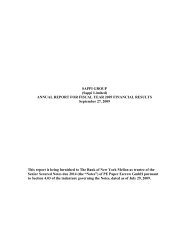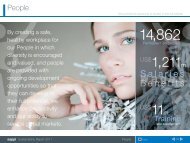Create successful ePaper yourself
Turn your PDF publications into a flip-book with our unique Google optimized e-Paper software.
A large percentage of our employees are unionized and wage increases or work stoppages by our<br />
unionized employees may have a material adverse effect on our business.<br />
A large percentage of our employees are represented by labor unions under collective bargaining<br />
agreements, which need to be renewed from time to time. In addition, we have in the past and may in the<br />
future seek, or be obligated to seek, agreements with our employees regarding workforce reductions,<br />
closures and other restructurings. We may not be able to negotiate acceptable new collective bargaining<br />
agreements or future restructuring agreements, which could result in labor disputes. Also, we may<br />
become subject to material cost increases or additional work rules imposed by agreements with labor<br />
unions. This could increase expenses in absolute terms and/or as a percentage of net sales. Although<br />
we believe we have good relations with our employees, work stoppages or other labor disturbances may<br />
occur in the future which could adversely impact our business.<br />
Concerns about the effects of climate change may have an impact on our business.<br />
Concerns about global warming and carbon footprints, as well as legal and financial incentives<br />
favoring alternative fuels, are causing the increased use of sustainable, non-fossil fuel sources for<br />
electricity generation.<br />
The increased emphasis on water footprint in southern Africa is causing increased focus on the use<br />
of water by our operational units, on the quality of water released back into the water systems and on the<br />
control of effluent. The costs of water used also have a direct bearing on our input costs and operating<br />
profit.<br />
Climate change could also cause the spread of disease and pestilence into our plantations and fiber<br />
sources, far beyond their traditional geographic spreads, increasing the risk that wood supply necessary<br />
to our operations may be negatively impacted.<br />
Our ability to utilize our net operating tax loss carry forwards generated by our United States<br />
operations could be substantially limited if we experience a Company ownership change as<br />
defined under the United States Internal Revenue Code, which may adversely affect our results of<br />
operations and financial condition.<br />
As a result of Sappi Fine Paper North America’s past financial performance, we have net operating<br />
tax loss carry forwards generated by our United States operations. Section 382 of the Internal Revenue<br />
Code of 1986, as amended (the ‘‘Code’’), contains rules that limit the ability of a company that<br />
undergoes an ownership change, at the Sappi Limited company level, to utilize its net operating tax loss<br />
carry forwards in years after the ownership change. An ‘‘ownership change’’ for purposes of Section 382<br />
of the Code generally refers to any change in ownership of more than 50% of the company’s shares over<br />
a three-year period. These rules generally operate by focusing on ownership changes among<br />
shareholders owning, directly or indirectly, 5% or more of the share capital of a company or any change<br />
in ownership arising from a new issuance of the company’s shares.<br />
If we undergo an ownership change for purposes of Section 382 as a result of future transactions<br />
involving our share capital, including purchases or sales of shares between our greater than 5%<br />
shareholders, our ability to use our net operating tax loss carry forwards generated by our United States<br />
operations would be subject to the limitations of Section 382. Depending on the resulting limitations, a<br />
portion of our United States net operating tax loss carry forwards could expire before we would be able<br />
to use them. Our inability to utilize our United States net operating tax loss carry forwards could have an<br />
adverse effect on our financial condition and results of operations.<br />
11


